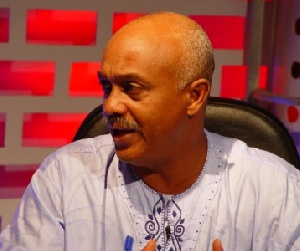General News of Sunday, 9 October 2016
Source: classfmonline.com
NDC manifesto: 53% score poor - Casely-Hayford
The score of 52.9 percent by policy think tank IMANI Ghana on the fulfilment of the 2012 manifesto by the National Democratic Congress (NDC) is not a mark of success, a member of OccupyGhana, Sydney Casely-Hayford, has said.
For him, even though the score was slightly above 50 percent, it could be considered as “just average”, adding that the party still falls short of a good or excellent mark based on its promises.
He held a strong view that scoring a figure distant from a good score, the party could not be said to have performed to a level that should convince Ghanaians to have them continue to govern the nation.
Mr Casely-Hayford told Umaru Sanda on Citi FM’s The Big Issue on Saturday, October 8: “52.9% is just average and makes you an average achiever and does not give you any particular extra credit for just managing to scrape through.”
He added that with such a mark, one cannot be considered to add “anything extra” to what citizens want.
In his opinion, “You must have something special that makes you stand out from the rest of the average people.”
By his judgement, if the score “rises above 65%, then one can be considered to have done something [significant]”.
IMANI released its latest findings at a programme called Final Report Card on the National Democratic Congress’ performance in office at the Coconut Grove Regency Hotel in Accra on Thursday, 6 October. Mr Brian Dzansi, Director of Technology and Social Media at IMANI, said: “If I will take you back to our scale, we had different rates for each of our sub-themes, and when we put all the data together into that scale, we scored 52.9 percent but one will ask, what does the 52.9 percent, which is a fair performance, mean?
“As researchers, what we have done is to collate all these promises, about 500 of them, and collect data on each of the promise. We did our analysis and we did our scoring. Then we went to validate this with the ministries, departments, and agencies and this was the final score we came out with.
“Now we throw it back to you, the listener and the voter. What does 52.9 percent performance mean to you? We pose the question if the NDC has been able to fulfil 52.9 percent of their promise. Has it impacted your life? Has our livelihood improved over the last four years if 52.9 per cent of these promises were fulfilled? If the answer is no, then we need to ask ourselves one critical question: ‘Were the promises even what we actually needed?’”
According to Mr Dzansi, Ghanaians “should also ask ourselves the new promises which the political parties are coming out with right now for the 2016 elections, we need to demand that these promises are smart, they should be specific, we want them to be measurable, we want them to be achievable, we want them to be relevant to our situations and we want them to be time-bound because when we were doing the scoring, one thing we realised was that most of the promises were really vague – ‘we will encourage’, ‘we will try’ – those promises are very difficult to track and do those promises actually solve our problems? That is the question we are throwing out there to you. We are demanding that moving forward, all political powers should come out with very smart promises”.










